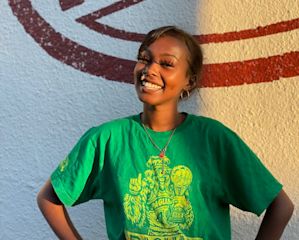Community Passageways: Altering Lives

Nearly eighteen, Muna Abdi just graduated from high school and works part-time at Pagliacci Pizza in Columbia City. Muna is looking forward to picking up a few more shifts at Pagliacci, savoring her accomplishments, and enjoying her summer. Soon she will begin looking into cosmetology schools as she follows her dream of starting her own business.
What is astonishing about this passage into adulthood is three years ago, few would have predicted Muna would finish high school or hold down a job.
“I was a teenager going down the wrong path,” Muna says. “I was probably going to wind up in jail.”
At loose ends, Muna’s mother and brother connected her to Community Passageways, a small community-based, black run, black-owned organization founded in 2015 by Dominique (Dom) Davis. Community Passageways works primarily with court-involved young people of color and they are committed to breaking the school-to-prison cycle with a school-to-life pathway. In the last five years, Dom and his team have helped divert over 120 years of prison sentences. More importantly, though, are the lives restored, the dreams nurtured, the life skills developed.
“Dom invited me to his Tuesday healing circle and I didn’t know what to expect. I was going through the motions,” Muna says. “But I learned so many things. I went to every circle after that, and I just haven’t stopped going.”
Once Community Passageways begins to work with a young person, they pair them with an ambassador who helps coach them through their challenges. Toyra Tate is Muna’s ambassador. “Every kid we’ve worked with has some kind of trauma,” Toyra says. “And we have to deal with the trauma so they can make it and be successful in the future. Once you deal with the trauma and the kids start healing, everything falls into place. I’m proud of the kids we’ve been working with. Especially Muna. I treat her like she’s my daughter.”
Muna says, “Toyra, Dom, there are so many in this group I could call my family. I’ve watched them change the lives of a lot of people.”
Even now that her life is on track and she’s about to become an adult, Muna says, “I don’t think I’ll ever not be a part of this community. They took me in like I was their own. They started loving me the first time I walked into that group. They got me to where I am right now.”

